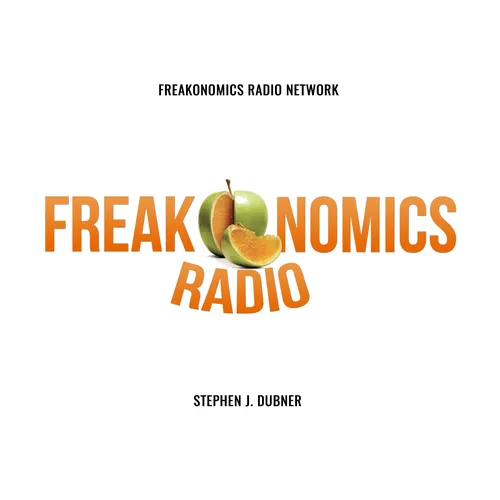
Freakonomics Radio
Freakonomics co-author Stephen J. Dubner uncovers the hidden side of everything. Why is it safer to fly in an airplane than drive a car? How do we decide whom to marry? Why is the media so full of bad news? Also: things you never knew you wanted to know about wolves, bananas, pollution, search engines, and the quirks of human behavior.
To get every show in the Freakonomics Radio Network without ads and a monthly bonus episode of Freakonomics Radio, start a free trial for SiriusXM Podcasts+ on Apple Podcasts or by visiting siriusxm.com/podcastsplus.
- Update frequency
- every 5 days
- Average duration
- 41 minutes
- Episodes
- 857
- Years Active
- 2010 - 2025

456. How to Fix the Hot Mess of U.S. Healthcare
Medicine has evolved from a calling into an industry, adept at dispensing procedures and pills (and gigantic bills), but less good at actual health. Most reformers call for big, bold action. What hap…

Policymaking Is Not a Science (Yet) (Ep. 405 Rebroadcast)
Why do so many promising solutions — in education, medicine, criminal justice, etc. — fail to scale up into great policy? And can a new breed of “implementation scientists” crack the code?

How Does New York City Keep Reinventing Itself? (Bonus)
In a word: networks. Once it embraced information as its main currency, New York was able to climb out of a deep fiscal (and psychic) pit. Will that magic trick still work after Covid? In this instal…

455. Are You Ready for a Fresh Start?
Behavioral scientists have been exploring if — and when — a psychological reset can lead to lasting change. We survey evidence from the London Underground, Major League Baseball, and New Year’s resol…

454. Should Traffic Lights Be Abolished?
Americans are so accustomed to the standard intersection that we rarely consider how dangerous it can be — as well as costly, time-wasting, and polluting. Is it time to embrace the lowly, lovely roun…

453. A Rescue Plan for Black America
New York Times columnist Charles Blow argues that white supremacy in America will never fully recede, and that it’s time for Black people to do something radical about it. In The Devil You Know: A Bl…

Am I Boring You? (Ep. 225 Rebroadcast)
Researchers are trying to figure out who gets bored — and why — and what it means for ourselves and the economy. But maybe there’s an upside to boredom?

452. Jeff Immelt Knows He Let You Down
Not so long ago, G.E. was the most valuable company in the world, a conglomerate that included everything from light bulbs and jet engines to financial services and The Apprentice. Now it’s selling o…

451. Can I Ask You a Ridiculously Personal Question?
Most of us are are afraid to ask sensitive questions about money, sex, politics, etc. New research shows this fear is largely unfounded. Time for some interesting conversations!

450. How to Be Better at Death
Caitlin Doughty is a mortician who would like to put herself out of business. Our corporate funeral industry, she argues, has made us forget how to offer our loved ones an authentic sendoff. Doughty …

449. How to Fix the Incentives in Cancer Research
For all the progress made in fighting cancer, it still kills 10 million people a year, and some types remain especially hard to detect and treat. Pancreatic cancer, for instance, is nearly always fat…

448. The Downside of Disgust
It’s a powerful biological response that has preserved our species for millennia. But now it may be keeping us from pursuing strategies that would improve the environment, the economy, even our own h…

447. How Much Do We Really Care About Children?
They can’t vote or hire lobbyists. The policies we create to help them aren’t always so helpful. Consider the car seat: parents hate it, the safety data are unconvincing, and new evidence suggests an…

446. “We Get All Our Great Stuff from Europe — Including Witch Hunting.”
We’ve collected some of our favorite moments from People I (Mostly) Admire, the latest show from the Freakonomics Radio Network. Host Steve Levitt seeks advice from scientists and inventors, memory w…

Trust Me (Ep. 266 Rebroadcast)
Societies where people trust one another are healthier and wealthier. In the U.S. (and the U.K. and elsewhere), social trust has been falling for decades — in part because our populations are more di…

445. Why Do We Seek Comfort in the Familiar?
In this episode of No Stupid Questions — a Freakonomics Radio Network show launched earlier this year — Stephen Dubner and Angela Duckworth debate why we watch, read, and eat familiar things during a…

444. How Do You Cure a Compassion Crisis?
Patients in the U.S. healthcare system often feel they’re treated with a lack of empathy. Doctors and nurses have tragically high levels of burnout. Could fixing the first problem solve the second? A…

443. A Sneak Peek at Biden’s Top Economist
The incoming president argues that the economy and the environment are deeply connected. This is reflected in his choice for National Economic Council director — Brian Deese, a climate-policy wonk an…

PLAYBACK (2015): Could the Next Brooklyn Be ... Las Vegas?!
Tony Hsieh, the longtime C.E.O. of Zappos, was an iconoclast and a dreamer. Five years ago, we sat down with him around a desert campfire to talk about those dreams. Hsieh died recently from injuries…

442. Is it Too Late for General Motors to Go Electric?
G.M. produces more than 20 times as many cars as Tesla, but Tesla is worth nearly 10 times as much. Mary Barra, the C.E.O. of G.M., is trying to fix that. We speak with her about the race toward an e…